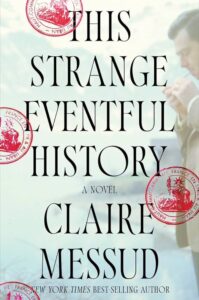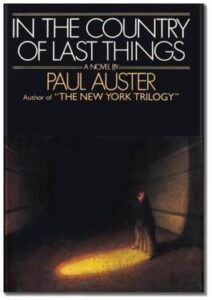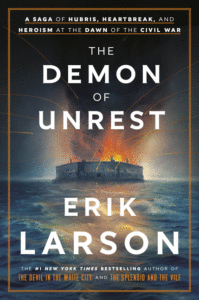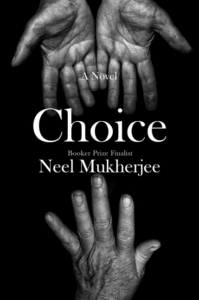
5 Book Reviews You Need to Read This Week
“Kafka seems both genius and ingenue, and the contradiction brings him closer to us.”
Our quintet of quality reviews this week includes Leigh Haber on Claire Messud’s This Strange EventfulHistory, Chris Power on The Diaries of Franz Kafka, Lily Meyer on Neel Mukherjee’s Choice, Alexis Coe on Erik Larson’s The Demon of Unrest, and Padgett Powell on Paul Auster’s In the Country of Lost Things.
Brought to you by Book Marks, Lit Hub’s home for book reviews.
*

“Though the novel is both sweeping and intimate, spanning seven decades and six continents, from World War II through the aughts, Messud’s piercing interiority keeps the focus tight, gaining the reader access to her characters’ innermost thoughts. Her attention to detail, memory, and foreshadowing suggest the influence of Tolstoy and Proust, but what’s most evident as we turn the novel’s 400-plus pages is the sense that we are engaging with work that is extraordinarily personal to the author. There’s a reason for that: The fascinating—and singularly dysfunctional—family about which Messud is writing is her own. In portraying the Cassars, Messud hews closely to a 1500-page ‘family history’ her grandfather wrote and bequeathed to her. The novel is narrated from the points of view of a cast based on her grandfather, her father, her mother, her aunt, and the author herself …
In writing this breathtaking ode—and lament—of a novel, Messud honors her ancestors by interrogating the circumstances that shaped them and the questions that plagued them. As she wrote in Kant’s Little Prussian Head and Other Reasons Why I Write: ‘Our human passion for storytelling—not simply for sharing information, but for giving meaning and shape to events—has motivated individuals and armies… stories have held up a mirror and taught us who we are and what we believe.’ It is in this spirit that Messud gifts us with her family’s journey.”
–Leigh Haber on Claire Messud’s This Strange Eventful History (The Boston Globe)
“Benjamin’s aim is to catch Kafka in the act of writing, and to present the diaries not as a cohesive whole, as Brod’s version does, but as ‘Schrift, writing as a fluid, ongoing, goalless activity.’ To this end we get spelling mistakes, scraps of abandoned stories, entries that break off in mid-sentence, and, due to Kafka’s habit of rotating between notebooks rather than writing in one until it was finished, an achronological experience in which we might read the back half of a story 200 pages before its beginning, or pinball from 1912 to 1914 and back again. Brod’s version smoothed such irregularities away, as well as prudishly cutting anything sexual.
The Kafka whose posthumous reputation Brod did so much to control, until death loosened his grip in 1968, was not a brothel visitor, nor someone who would describe a male Swedish tourist’s legs as so taut ‘that one could really only run one’s tongue along them.’ More important, in terms of changing the uniquely intimate experience the diaries offer, was Brod’s decision to excise the fiction. One of the book’s greatest pleasures is to read a dull list about who Kafka wrote letters to the day before, then turn the page and discover the first draft of The Judgment, the story that marked a revolution in his work … This new edition restores the variegated richness—and, at times, the tedium—of the diaries…
The muddled presentation of all these elements, contextualized by thorough notes, gives the sense of Kafka not just as ‘the representative genius of the modern age,’ as Benjamin describes him, but also a youngish man finding his way, hungry for experience and inspiration, venting his frustrations and following his interests. Here Kafka seems both genius and ingenue, and the contradiction brings him closer to us … the diaries, in which fiction, confession, dreams, wry humor, and despair combine in a messy, hypnotic network, feel like the closest thing to a path, so like a tripwire, that leads to the threshold of Kafka’s abiding mystery.”
–Chris Power on The Diaries of Franz Kafka (The Guardian)
“The Civil War is one hell of a drug. It’s plentiful and Main Street-legal, but can induce hallucinatory visions when mixed with inflammatory substances … When Larson, the reigning king of Dad History, drops a new book on the Civil War a month and a half before Father’s Day in a pivotal election year, he knows what he’s doing. Sort of. The Demon of Unrest is Larson’s first book on the Civil War. And his green horns show …
A Larson book is like the Dead Sea: The extraordinarily dense level of details…usually allows readers to float on his narrative without much effort. I tried my best not to swim, but on more than one occasion, I almost drowned from exertion, especially in the incredibly banal final stretch. And still there was something lacking in the book’s 565 pages: Nary a Black person, free or enslaved, is presented as more than a fleeting, one-dimensional figure. Frederick Douglass, a leading abolitionist and standard of histories of the era, warrants no more than a mention. Black people are primarily nameless victims of an antagonistic labor system that’s causing a political crisis among white Americans … A swaggering disregard for the difference between the shopworn and the truly complex that leads straight into the pitfalls of nostalgia and hubris.”
–Alexis Coe on Erik Larson’s The Demon of Unrest: A Saga of Hubris, Heartbreak, and Heroism at the Dawn of the Civil War (The New York Times Book Review)
“It’s a triptych novel in the vein of Susan Choi’s Trust Exercise and Lisa Halliday’s Asymmetry, which use their three parts to repeatedly surprise and challenge readers. Compared with these novels, Choice is both more ambitious and less successful, harmed by the fact that its second and third sections just cannot compete with its blistering first. But that first section is a barn burner. Mukherjee starts Choice with the story of Ayush, an editor at a prestigious London publishing house, whose obsession with the climate crisis lands somewhere between religious fervor and emotional disorder—especially as far as his kids are concerned …
By not showing the consequences of Ayush’s actions, Mukherjee leaves incomplete the book’s exploration of parenting. What his abdication means to Masha, Sasha, and Luke is hidden. What it means to the reader, though, is clear. In Choice, there is no such thing as a perfect decision or a decision guaranteed to go right. There are only misjudgments and errors—and the worst of those are the ones that can never be undone.”
–Lily Meyer on Neel Mukherjee’s Choice (The Atlantic)

“The novel is Anna’s letter home to an old friend from childhood. Into this letter, this chronicle of unrelenting travail for Anna Blume, Mr. Auster, author of the highbrow mysteries of The New York Trilogy, proceeds at a trilogist’s pace and with a series of high-novel dares … These are daring touches, and they let us drop all notion of having to suffer a didactic, finger-wagging account of how we ruined ourselves. Not Mr. Auster’s game at all. What did happen? ‘Collapse’ is the entire explanation offered—late in the book—again, the worst word conceivable for the free-enterprise believer, yet nowhere is there a suggestion that a socialist order has prevailed. As if to further not let us worry on this score, Mr. Auster keeps on offering novelistic dares. He will try to surprise with the obvious, and he will advance the story with the madly (but somehow not maddeningly) coincidental. The boldness of these maneuvers—rather like the big lie—allows them to work …
These are heavy chords that Mr. Auster gets away with playing because they are not, one feels, the main music; in fact, some of the large action here may satirize narrative action itself … Mr. Auster seems most interested in this problem of confronting a limited thing with talk that shall not be, or cannot be, limited…It is an asymptotic approach of expression to the nothing it finally defines, an infinite series of effables toward the ineffable. It is not simply objects that are disappearing. Human things are on the wane too. Mr. Auster offers Anna nothing in the way of hope and wants her to make a generous, human account of it anyway. In light of this aim, if indeed it is Mr. Auster’s, it is telling that (Louis-) Ferdinand is bumped off early, and that Anna, facing a world ever bleaker than Celine’s, remains resilient, plucky, apologetic for uncivilized behavior necessary to survive, and hopeful yet.”
–Padgett Powell on Paul Auster’s In the Country of Lost Things (The New York Times Book Review)
Book Marks
Visit Book Marks, Lit Hub's home for book reviews, at https://bookmarks.reviews/ or on social media at @bookmarksreads.























